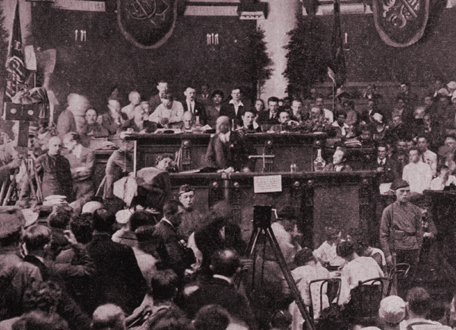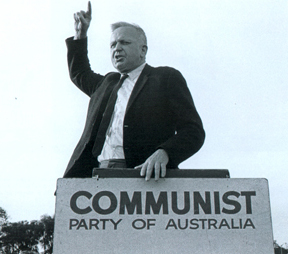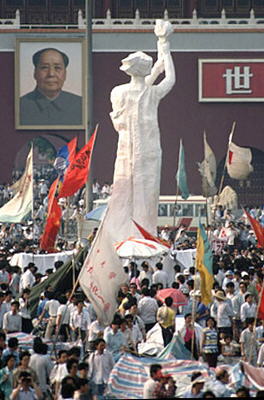Stalinism
Versailles vs Comintern: two visions of world peace

By Barry Healy
June 28, 2009, was the anniversary of the two bookends of World War I, in which it is estimated more than 15 million people died. On that date in 1914 Austrian Archduke Franz Ferdinand was assassinated in Sarajevo and, five years later, in 1919, 90 years ago this year, the Versailles Treaty was signed in Paris.
The first war in which the capacity of modern industry to deploy, feed, arm and dismember people was so hideously demonstrated, WWI was experienced by its victims as the "war to end all wars". Unfortunately, it proved not to be.
Out of the ashes of the conflict two competing visions of world peace arose: Versailles and the revolutionary and democratic alternative represented by the Communist International (Comintern) emanating from the 1917 Russian Revolution.
US President Woodrow Wilson swept into the treaty negotiations declaring: “The world must be made safe for democracy.” Over six months of intense horsetrading at Versailles a new imperialist order was hammered out, resulting in many of the conflicts that followed.
Australia: Towards a history of the Communist Party of Australia
[These articles were first published in Green Left Weekly in 1995 to mark the 75th anniversary of the founding of the Communist Party of Australia.]
By John Percy
September 27, 1995 -- Seventy-five years ago, under the impact and inspiration of the October 1917 Russian Revolution, the Communist Party of Australia was founded. It was a modest beginning, but an historic event. The CPA formed in 1920 finally dissolved in 1991, but for most of its life it was the dominant party on the left in Australia and an important force in the workers movement.
There are many
proud chapters in its history -- the numerous trade union struggles
led; organising the unemployed, women, Aborigines, young people;
important civil liberties fights; and solidarity with international
struggles, in Spain, Indonesia, Vietnam, South Africa and East Timor,
to name a few.
The CPA's founders had a vision of socialist
revolution in Australia, and this was the goal of most of its
rank-and-file members over the years. The party inspired dedication and
commitment from thousands of men and women, and organised the most
militant, idealistic, self-sacrificing section of the Australian
working class.
But it was also a history of mistakes, of betrayals, of lost opportunities.
To mark this important anniversary, Green Left Weekly will be carrying a series of articles on the history of the CPA.

By Dave Holmes
[This talk was presented at the A Century of Struggle — Laborism and the radical alternative: Lessons for today conference, held in Melbourne, Australia, on May 30, 2009. It was organised by Socialist Alliance and sponsored by Green Left Weekly, Australia’s leading socialist newspaper. To read other talks presented at the conference, click HERE.]
50 years after: The tragedy of China’s `Great Leap Forward'
April 21, 2009 – Socialist Voice – On October 1, the People’s Republic of China will mark the 60th anniversary of its foundati
Lessons from the past: The Great Depression and the Communist Party of Australia

A section of the Wharfie's Mural, the large-scale work of art from the walls of the CPA-led Waterside Workers Federation (WWF) canteen in Sussex Street, Sydney, in the 1950s and '60s.
By Dave Holmes
[This is an excerpt from the new pamphlet, Meltdown! A socialist view of the capitalist crisis, by Resistance Books. Meltdown! features essays by John Bellamy Foster, Phil Hearse, Adam Hanieh, Lee Sustar and others. Purchase a copy from Resistance Books.]
The current economic crisis is a fundamental crisis of the world capitalist system. British socialist Phil Hearse calls it the “third slump” in the history of the capitalism (the other two being the Great Depression of the 1930s and the 1974-75 sharp downturn). And the levels of mass distress may yet come to rival the 1930s.
Present-day Russia needs a renewal of the feminist movement

By Anna Ochkina, translated from Russian for Links International Journal of Socialist Renewal
Proceedings of Fourth Congress of the Communist International to be published
In October, John Riddell, co-editor of Socialist Voice, completed a draft translation of the proceedings of the Fourth Congress of the Communist International. This ambitious effort (more than 500,000 words) will make all of the resolutions, speeches, and debates from that important 1922 meeting, together with full explanatory annotation, available in English for the first time. The work, which Riddell is preparing in collaboration with the London-based journal Historical Materialism, is planned for publication in 2010.
The British newspaper Socialist Worker interviewed John Riddell (below) about this project for its November 22, 2008, issue.
* * *
By Ken Olende
In 1922 socialists from around the world travelled to Russia to discuss and debate the future of the workers’ movement.
Nationalism, revolution and war in the Caucasus
By Tony Iltis
August 27, 2008 -- Since the European Union-brokered ceasefire brought the shooting war between Georgia and Russia to an end on August 12, there has been a war of words between Russia and the West. One point of contention is the withdrawal of Russian troops from Georgia-proper (that is, Georgia excluding the de facto independent territories of Abkhazia and South Ossetia), in particular the towns of Gori, Zugdidi and Senaki and the port of Poti.
The war began with Georgia’s August 7 attack on the territory of South Ossetia. Russia responded with a military assault that first drove Georgian troops out of South Ossetia, then continued to advance within Georgia-proper.
Russia agreed to withdraw when it signed the ceasefire and has since indicated that it is doing so — but slowly, and not before systematically destroying Georgia’s military capacity.
A bigger difference, based on competing interpretations of what is and isn’t Georgian territory, is Russia’s stated intention to maintain a beefed-up peacekeeping presence in South Ossetia and Abkhazia.
A history of the Australian Labor Party, 1890-1967
Conrick's History of the Australian Labor Party originally appeared in Direct Action (the precursor to Green Left Weekly), newspaper of the Socialist Workers League of Australia, between December 21, 1972, and June 14, 1973, and was published as a pamphlet by the Socialist Workers Party in 1979. The SWP is now the Democratic Socialist Perspective (DSP). This digital version was created by Ozleft. The pamphlet reflected the DSP's attitude towards the ALP at that time, however significant changes were introduced to this viewpoint in the 1980s. This document should be read in conjuction with The ALP and the Fight for Socialism. See also The ALP, the Nuclear Disarmament Party and the 1984 elections.
For a deeper analytical treatment of the social origins of social democracy in general and the ALP in particular, please consult Jonathan Strauss' series of Links articles on the concept of the labour aristocracy.
